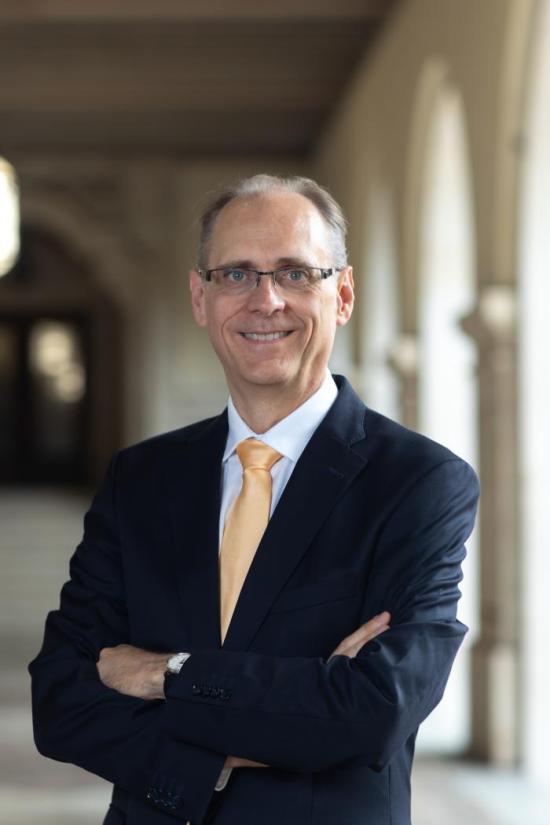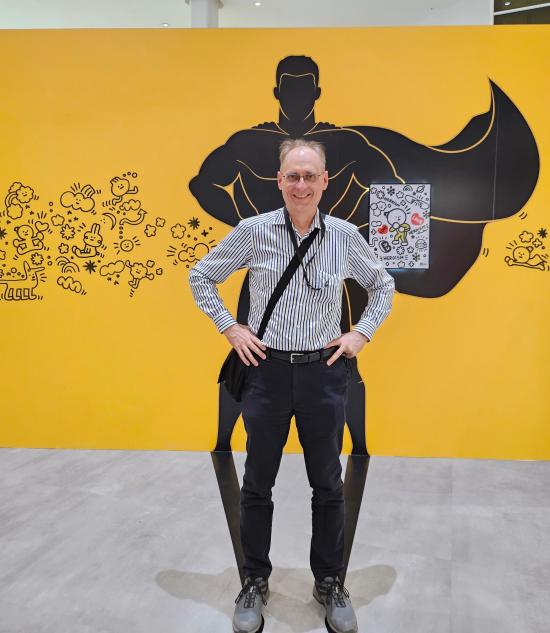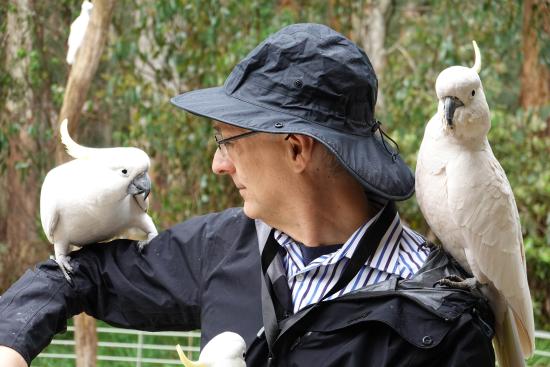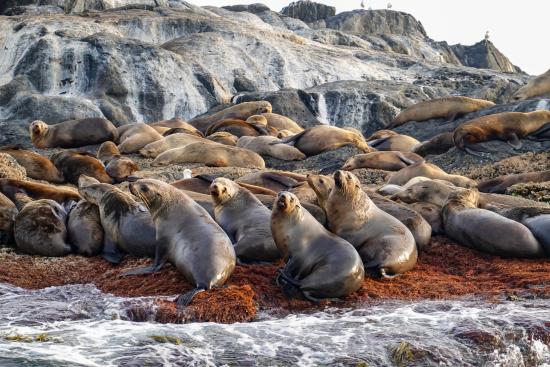On August 1, 2024, Eric T. Meyer, previously dean of the University of Texas at Austin’s School of Information, began his tenure as dean of the University of California, Berkeley, School of Information. Meyer succeeded Professor Marti Hearst, who served as interim dean for the 2023-24 academic year. We spoke with Dean Meyer about his plans for the year, lessons learned at UT Austin, and what he does in his spare time.
This interview has been edited for length and clarity.
What are you looking forward to in your first year as dean?
I think this is a really opportune time for the I School to map its next decade…. I think it can be a defining decade for the School of Information. So what I’m looking forward to is: working with faculty, staff, students, alumni, and employers to figure out what the strengths that we already have are, what our strengths could be, and map out a way to get there as a school. It’s an opportunity to think strategically about what we want the Berkeley School of Information to be known for.
You’ve spent your entire career in public universities. What draws you to them and why have you remained committed to working in public universities?
Public universities are absolutely —I’ve heard the chancellor say this—engines of opportunity. They are operating at a big scale. These are mostly big universities I’ve been at, and the thing that they do for society is they give so many people an opportunity to change their lives.
They’ve changed my life. I started out on a small farm in Ohio, and have been able to get to where I am today. I’ve been associated with some of the greatest universities in the world—Berkeley, Oxford, Texas—and it’s only because I have been able to get access to good education and supportive mentors at all those institutions.
It’s not just that the institutions exist, but it’s the people in those institutions who are dedicated to helping people improve their lives. That’s what makes me so proud of having spent my whole career in public universities.
Who were your early influencers in life? Who inspired you?
The biggest one is Rob Kling. He was my supervisor for my Ph.D. until he passed away. Most people call him the father of social informatics. He was a very intellectually generous person.
I remember my supervising meetings with him in his office. It was set up such that he had a desk with a computer on one side and a seat on the other, so he could be looking at you and his computer was to his right. If he was sitting there talking to you, you’d have a good conversation, but you hadn’t excited him yet. When you excited him was when he suddenly turned away from you to his computer. And to someone who wasn’t familiar with Rob, you would have thought, “Well, okay, I’ve lost his attention. He’s suddenly typing emails or something.” What he was doing was sending me dozens of emails about readings that he wanted me to follow up on. When he and I were on the same page, he got so excited and was very generous with sharing his thoughts and sharing all these articles.
That kind of general lesson is what I’ve always tried to do with my own students when I can. It’s making sure that I help them make the connections, and make sure they understand the things that I can help them understand. Rob was a huge influence in my career, and in the way I think about working with students, and the way I do my research. I’m proud to hold the title at Berkeley of ‘Chancellor’s Professor of Social Informatics’: it is a reflection of my intellectual focus, but also a tribute to the impact Rob had on my life by carrying on the field he worked to establish.
There were a few people when I was an undergraduate who encouraged me to continue onto graduate school. One is Eric Wagner. He was the chair of my sociology and anthropology department. He was just very generous and kind and encouraged a farm kid from Ohio to think about applying to a place like UC Santa Barbara, where I got my master’s degree. That’s a long way away; it’s in a shiny, exciting place. But I went and it’s partly because of not just him, but several of the faculty at Ohio U making me see that as a possibility for myself.
Bill Dutton, who was the founding director of the Oxford Internet Institute, hired me to work with him there and supported the growth of my career which started from a one year temporary research fellowship. One of the interesting connections in my life is that Bill Dutton and Rob Kling worked together as early career scholars at UC Irvine back in the 70s and wrote a book together about postsuburban California. These networks all sort of combine and recombine over time as you run into people again. That’s the power of the networks in academia.
I view my job largely as being a connector of people. So, knowing enough about my students here, the faculty here, that when I meet somebody and say, “Ah, you need to talk to this faculty member... You need to talk to this doctoral student...You need to talk to this alumnus” and introduce them and then I can step back while they continue on their own conversations and the research it sparks. That’s what I view as one of the primary roles of a dean.
How would you describe your leadership style?
I hope people see me as approachable. I’m not standoffish. I keep my door open a lot so people can come in and see me.
I want people to come to me with ideas and know that they’re going to be taken seriously. I want people to feel trusted. The reason that people work here is because they’ve got great skills and great knowledge, whether they’re on the staff or the faculty. I want to understand that and amplify it and trust that. So I’m engaged, but not intrusive. I am particularly interested in the mentoring I am able to do in my leadership role: I love talking with faculty and doctoral students about their careers, working with staff including assistant and associate deans to hone their own leadership styles, and being open and honest with people interested in how to plan their paths.
And I think the thing that some people who take on dean roles have the hardest time navigating is the fact that at a university, you’re in this position where you’re both advocating for, but also explaining to people other people's points of view. So, if the chancellor or the provost make certain decisions that are either popular or unpopular, part of my job is to help others understand the reason for it and how it's affecting us, positively or negatively. Likewise, when I’m going to the chancellor or the provost, I explain what the priorities here at the school are and things that people are either happy about or unhappy about. Being able to maintain those connections in a way that keeps those dialogues going in a positive way is actually kind of tricky.
I trust all the faculty, staff, and leadership here to want the university to succeed. We may have disagreements on how to achieve that, but I do trust we’re all pushing in the same direction and my job is to help people understand other’s positions so that we are more likely to come out with something that people are either happy with or at least satisfied with at the end.
In your time as the dean of UT Austin’s School of Information, what lessons did you learn that you want to bring to UC Berkeley’s I School?
I’d say the biggest lesson I learned as dean is that the other deans are allies. I was constantly tapping into that network of deans there, and I've already started to do that here.
The deans here are really great people with lots of great ideas and want to be helpful to us. So as we’re trying things that work for the school or could work for the school, I’ll be talking to my fellow deans to be able to understand what may have worked in the past and what didn’t work to understand what kind of approaches and methods there are to make things advance here at the University of California.
The other thing I learned is the importance of not letting communication vacuums build up because people will fill them with something, even if it’s inaccurate.
You’ve lived and studied in multiple cities/countries/continents. How has being a global citizen informed your worldview?
Travel is great because it broadens your horizons, but the thing you don’t get in tourist travel is a deeper understanding of how people view the world differently in different places. I think living in places longer, you can start to get that. It still takes a while. I can’t claim that I know exactly how other people think, but I think I’ve got a better sense of that having lived in places and seeing the day to day challenges ,opportunities and joys that people have in different places. Even in the U.K., where I hold dual citizenship with my American citizenship, I still learn new things every time I go back to Britain.
You can gain a lot of insight into places just by shopping in local shops; going to local grocery stores; going to events that are geared toward local folks rather than toward tourists. To me, that has really meant that when I go someplace, like when I moved here to Berkeley, I view it as a great opportunity to sort of unpack: How do people in Northern California view the world? How do people at UC Berkeley view the world? And I guarantee you—everywhere I’ve been—there are differences there that have helped me understand more about myself and also understand more about my approach to whatever job I take on.
Kenya, for instance —I taught there many, many years ago for a year or so. It was through this exchange program at the University of Nairobi, which at the time was in a very challenging situation with poor facilities. But I saw the amount of enthusiasm that the students had for advancing their education. They were so excited about the opportunity to get an education, to try to advance their own knowledge about the world, and their own position in the world, and their families were absolutely trying to get them a better opportunity in life. I probably learned more from them about their worldviews than they did from me. And, now when I go into a classroom somewhere else, it colors how I view the students in the classroom because I say, “Oh, I can’t just assume I know everything about them because they are in a setting that I’ve worked in before.” Each group of students brings something new.
It gets you to question your own assumptions because they don’t work when you’re someplace else. Your assumptions about what constitutes a normal day just doesn’t work when you’re in a different place.
So, one of the things that I think I bring to a university like Berkeley is I’ve had experiences of some very different educational systems around the world. And there’s not one that's perfect. Hopefully, when I’m in conversations here, I can ask some questions like, “Well, why do we do it that way? I can give you three other examples of ways to do it.” Maybe the way we do it is what’s most appropriate, but maybe we can adjust it a bit based on things that we learn from elsewhere.
Now for some more casual questions — what’s a fun fact people may not know about you?
One of the things that Rob Kling told me to do is volunteer acting in a small theater in Indiana near where I got my Ph.D. So I did some acting in graduate school, and I’d done a little bit before in high school plays. He said, “It’s good for you...It’ll help you be able to project; it’ll help you be confident in front of people.”
Doing things like theater and the arts is something that I’ve got a background in. I was in band and choir and all that sort of stuff in high school. One of the ways that my wife and I both like to spend our time is we love going to the theater. The dean of fine arts at Texas used to joke that what I really wanted to be was in the fine arts because he and I have a lot of shared interests and my minor as an undergraduate was art, when I studied photography. I’m still interested in photography, but I don’t have time to do as much of it as I used to.
What are you reading or watching right now?
I tend to listen to audiobooks for pleasure when I am working on other things on the weekends. When my wife and I drove from Texas to here, we listened to a book (Not Tonight, Josephine: A Road Trip Through Small-Town America) about two Brits traveling across the country and a few spots we managed to be in that point of the book when we were at that point in the country.
I’ve been trying to find things that have a Berkeley or San Francisco connection lately. There is an older series that I’ll recommend: Spellman Files, about a family of private investigators in San Francisco. I picked it because I’ve been trying to listen to some fun light-hearted books that are set in the Bay Area while trying to get to know the area.
I think we started to do that back when we lived in Santa Barbara with the Alphabet series. [Sue Grafton] was writing that series when we were living in Santa Barbara. You could read them and see a lot of places that were basically around you. That got us in the habit of trying to read about places we are so that we can understand them. In Austin, we enjoyed reading the Kinky Friedman books. You get a little sense of the weirdness of Austin by reading Kinky Friedman. In England, we would read classics like Agatha Christie set in spots we would visit.
What’s your ideal day off?
We really like walking. I wouldn’t say serious hiking, but light hiking or walking. So getting out in nature and just getting fresh air. We’ve gone to the coast. We’ve been up in the hills. That’s one of the attractions to this place: good weather and a lot of really beautiful places to walk and hike.
Lots of places in England, you have the right to walk across private fields because there’s a historic path there. So most of our weekends were spent out walking or going to historic homes In England because there’s tons of historic homes and gardens in the National Trust.
A colleague from Texas and I were together in Seoul, Korea not long ago. We took this walk, and my wife was there too, up to the top of this hill in the middle of town. We got to the top, and he was just huffing and puffing.
He’s in good shape, but he doesn’t do things like that as often. The stuff my wife and I are doing all the time is things like climbing up and getting a nice view of a city. So, we thought it was good fun, but we got up there and he said, “Okay, yeah, this is pretty but I’m going to ask harder questions before I go on a walk with you guys again.”
Anything else you’d like to share about travel recommendations?
For scenery, nothing beats New Zealand. New Zealand is just stunning. For wildlife, Kenya is just beyond everything else. Whenever anybody asks that question, it’s always: what thing are you most interested in? Culture, people, history, scenery, wildlife, and cafes: all would lead to different recommendations.
One of my favorite places for food is London. I love London for a lot of reasons. One is that there’s just great food in London, and anywhere you go, you’re within a block of something that’s good.













